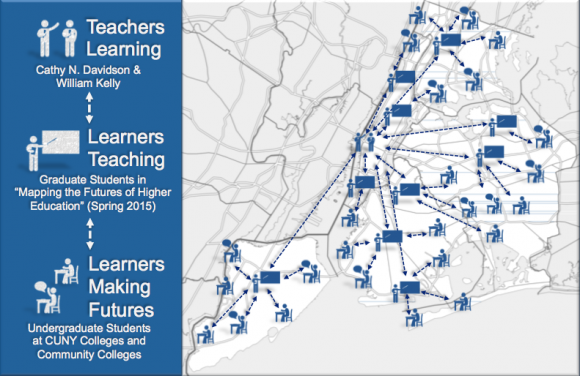“Mapping the Futures of Higher Education” (IDS 70200)
Cross-listed ANTH 80600; ART 80010; CL 80100; CRITICAL SOCIAL/PERSONALITY PSYCHOLOGY; EARTH AND ENVIRONMENTAL SCIENCES; ENVIRONMENTAL PSYCHOLOGY; ENGL 89010, URBAN EDUCATION
Spring 2015 Tuesday 4:15-6:15
Professors Cathy Davidson and William Kelly
The course is designed for second, third, or fourth year graduate students who are teaching during S 2015 at one of CUNY’s colleges or community colleges. Like the larger Futures Initiative, this course looks in two directions at once. First, it examines and then puts into practice a range of new peer-driven innovative pedagogies across disciplines that will serve graduate students who are committed to exploring a range of new teaching skills and objectives. The assumption here is that most of the methods, assessment tools, and the general apparatus of higher education were developed in the Industrial Age (roughly 1865-1925) and it is imperative that we design new cross-disciplinary methods and structures to rethink education for the new arrangements and informal learning styles of the Internet Age. Second, “Mapping the Futures of Higher Education” focuses on the role and requirements of public education in the U.S. in a stressed time where, nationally, we have seen several decades of defunding public education, leading both to a student debt crisis and a professorial crisis of adjunct or contingent labor practices. What are the costs of public education? Who bears them? What are the collective investments society makes in public education and what are the rewards?
In this course, we will design collaborative online tools, including a number of public ones, to include the students taught at the CUNY colleges in a semester-long inquiry and practicum into better ways of thinking, knowing, creating, and transforming institutional structures, both across fields and within them. One collective project we will develop in this course is a public, online “CUNY Map of New York” to represent the goals and the collective contribution of public higher education in a democracy. We’ll focus on public engagement and presentation of work; visual, digital, and data literacies; quantitative, qualitative, and performative thinking; translation of specialized doctoral research for a generalist audience (of peers, students, and the public); new forms of qualitative and quantitative assessment across all fields and levels; and analysis of the importance of access, diversity, quality, and equality for higher education and the collective good in a democratic society.
All of this will be driven by a student-designed syllabus that embodies the course’s core peer-learning collaborative methods.
Admission by Permission of the Instructor: Only 12-15 students maximum will be admitted in this first course offering. The goal is to have as diverse a cohort as possible, with students coming from as many crosslisting departments as possible and also teaching at the widest possible range of CUNY colleges or community colleges during the Spring 2015 semester. To that end, students interested in taking the course will need to complete a simple survey with this information. Students seeking admission should apply online by November 21, 2014: http://goo.gl/forms/uc5e9TSOcP
Please contact Ms. Lauren Melendez (lmelendez@gc.cuny.edu), Administrative Specialist for the Futures Initiative, if you have any additional questions.



[…] component of the upcoming Futures Initiative course, Mapping the Futures of Higher Education, will be for the class to develop a social contract within the course community, a way to […]